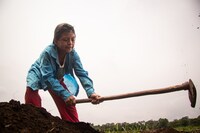
Report: Canadian imports of products that may contain child or forced labour hits $48B
by CM staff
The report urges Parliamentarians to pass Bill S-211, the Fighting Against Forced Labour and Child Labour in Supply Chains Act, which is slated for its third reading in the House of Commons in March.

Geovanni, 11, farms sugar cane and is one of the child labourers who may be part of the Canadian supply chain. (Photo: CNW Group/World Vision Canada)
MISSISSAUGA — Canadian connections to child and forced labour continue to worsen, creating urgency for government action, according to a new report released by aid agency World Vision Canada. The Supply Chain Risk Report 2023 reveals that the value of Canadian imports of everyday products, like electronics and clothing, that are at risk of being produced by child or forced labour, has increased to $48 billion as of 2021.
The report shows a surge in imports of risky goods of over 50 per cent in the last ten years, including a 71 per cent increase in electronics to $22.1 billion, a 67 per cent increase in clothing to $10.7 billion, and more than 869 per cent increase in imports of protective rubber gloves to more than $800 million in 2021.
World Vision Canada warns the problem is worsening due to climate change, conflict, Covid-19 and rising costs, leading to conditions that mean the number of child labourers has increased for the first time in two decades. Now, 160 million boys and girls are trapped in child labour, including 79 million who work in jobs that are dirty, dangerous and degrading.
“Progress in the global fight to end child labour is being lost. Even during a time of inflation and increasing costs at home, Canadians want to make purchases that have a positive impact on people and the planet. Clearly, we need leadership from the federal government to ensure that companies are doing everything they can to both support Canadians who wish to make informed purchasing choices, and to reverse these trends in their global supply chains,” said Michael Messenger, President and CEO, World Vision Canada.
The report urges Parliamentarians to pass Bill S-211, the Fighting Against Forced Labour and Child Labour in Supply Chains Act, which is slated for its third reading in the House of Commons in March.
If passed, this bill would require companies to publicly report on their efforts to prevent the use of forced labour and child labour within their global supply chains.
The law is currently proposed by Independent Senator Julie Miville-Dechêne and sponsored in the House of Commons by Liberal MP John McKay. Canada’s Labour Minister Seamus O’Regan recently committed to introducing further measures once the bill is passed. This comes as the European Union is slated to finalize their corporate sustainability due diligence directive later this year, which obligates companies to avoid and mitigate human rights risks.
“World Vision’s report highlights the urgency of passing S211. If passed Canada will leap from laggard to leader in the fight against forced labour with more initiatives to come,” said MP John McKay, sponsor of Bill S-211 in the House of Commons.